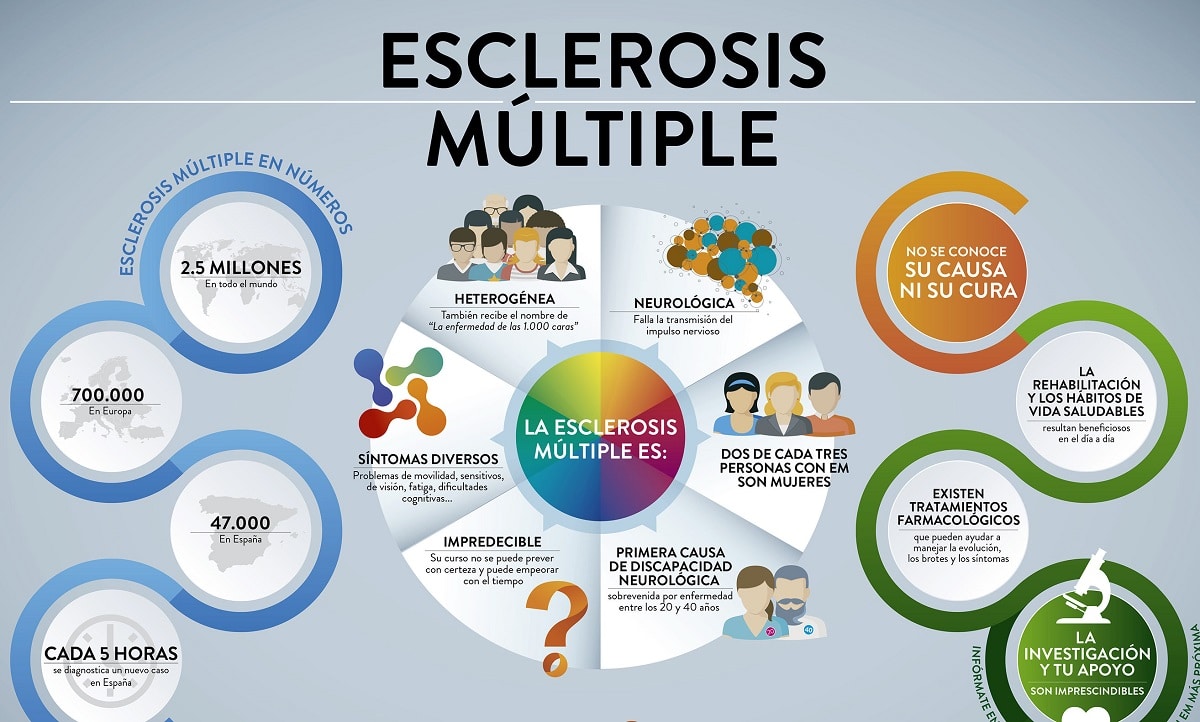
Today is dedicated to multiple sclerosis, the disease with a thousand faces. This is one neurological disease that affects the young more, and kids. So the advances in their treatment will greatly improve the lives of these people who can be affected by important limitations. This is a very disabling disease.
Thanks to many of the investigations that have been carried out in the fight against Covid-19, they have served to advance the study of other diseases, among them the one that concerns us. And it is that in science everything is linked. We will talk about these issues and others on World Multiple Sclerosis Day.
Relationship between the Covid-19 vaccine and multiple sclerosis

In January of this year, the journal Science published a work by the same group that synthesized the Pfizer / BioNTech vaccine against Covid-19. This group of scientists has successfully tested another messenger RNA (mRNA) vaccine that suppresses the symptoms of multiple sclerosis. The test has only been done in animals and in their multiple sclerosis models. We must be cautious and despite being very good and hopeful news, there is still a long way to go.
This research by the developer group of the vaccine Pfizer / BioNTech against Covid-19, comes to say (for laymen on the subject) that the development of animal multiple sclerosis symptoms is completely suppressed, when applied before symptoms appear. So it could be considered as a preventive treatment.
When applied once the animals have symptoms, they revert considerably. Animals regain part or even all of their motility thanks to an anti-inflammatory, non-restorative effect. This is certainly very hopeful news, but the treatment has not been studied in humans. This is a preclinical trial.
Vaccination against Covid-19 and sclerosis patients

The Multiple Sclerosis Study group of the Catalan Neurology Society has ensured that the vaccines authorized for Covid-19 are safe and they do not worsen the course of multiple sclerosis. Vaccination does not alter the mechanism of action of the drugs used to treat the disease. It has also not been shown that there is an increased risk of outbreaks after receiving a vaccine.
Therefore, there is reasonable confidence that It can be administered in patients with multiple sclerosis, both those treated and those who are not. There are people without treatment because they only develop the disease, in its first phase, with mild symptoms. The only thing that stands out is that the efficacy of the vaccine itself can be reduced when using drugs with greater immunosuppressive power. In this sense, they recommend looking for the best time for vaccination.
The Catalan Society of Neurology defends that it should be considered as population at risk to patients with multiple sclerosis older than 65 years, with a high degree of disability and who must receive or have received a bone marrow transplant or immunosuppressants. This exposure is included in the document: Recommendations on vaccination against COVID-19 for patients with MS.
Other Advances in the Study of Multiple Sclerosis

This relationship between the messenger RNA vaccine, whose system could also be used in patients with multiple sclerosis, is not the only advance that is taking place in treatments. Work continues to develop treatments that replace lost oligodendrocytes and myelin.
Hitherto there are more than 10 approved treatments for multiple sclerosis in humans. These are immunomodulatory drugs, which slow down the course of the disease, but cannot stop it completely, or cure it. These drugs often have significant side effects, such as reducing the effectiveness of defenses against other pathogens, beyond the high cost to health systems.
In this sense, a study carried out in the United States has concluded that the disease modifying treatment is associated with lower total costs, both direct and indirect for health systems. 69% of this saving corresponds to direct healthcare costs and the remaining 31% to losses in labor productivity.